Working with smallholder farming families, their livestock and FMD viruses in the Mekong & beyond
November 14, 2019
Article by Peter Windsor, Isabel MacPhillamy, Francesca Earp of Mekong Livestock Research, originally published here.
In our efforts to understanding how to improve livelihoods in rural SE Asia & regional food security, we are assisting the transition of some subsistence smallholder farmers from poverty to a more viable and sustainable livelihood through investing in improved livestock productivity. This work is focused on what motivates farmers to change their husbandry practices, including better feeding, preventative health & welfare, and improved household financial resilience. The collaborative work has been almost continuous since 2007 in the Mekong, supported by ACIAR-funded projects now completed in Cambodia & nearing completion in Laos, plus a DFAT Business Partnership Platform project that is current in Laos under a recently revised MOU between the partners (Figure 1). Fortunately we have been able to value-add these funding sources by successfully seeking numerous additional sources of support, including the Crawford Fund for field officer extension training, the New Colombo Plan for student participation, John Alwright, John Dillon and Australian Government Fellowship Awards for assisting Mekong scholars, plus collaborations with international agencies (eg OIE, ADB) and universities.
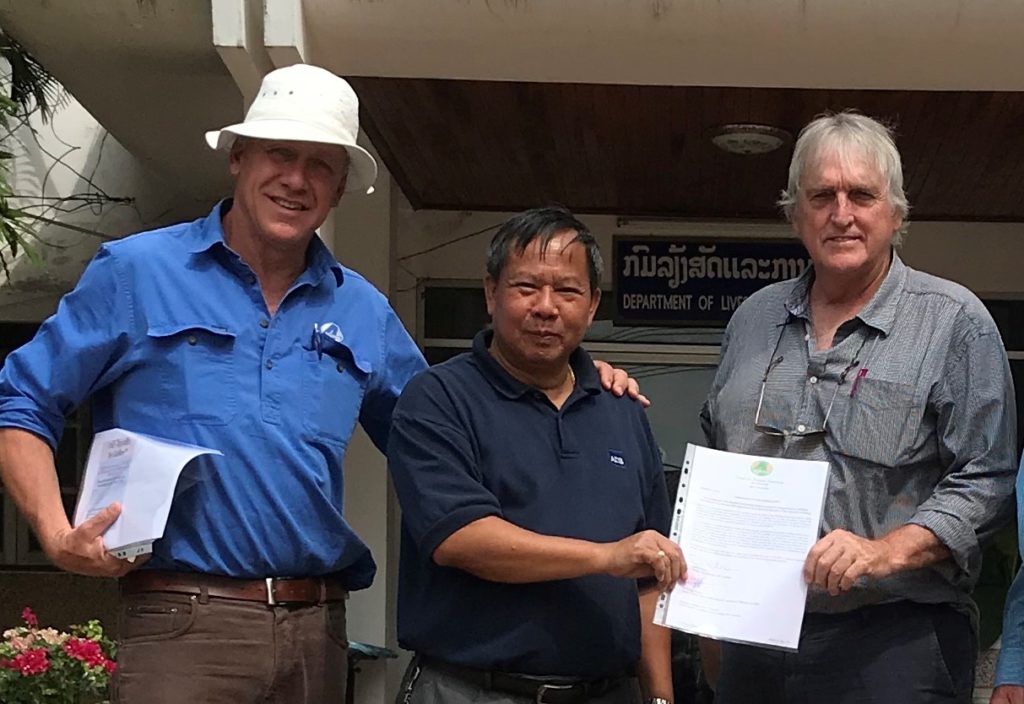
BPP partners Mr Chick Olsson, Dr Syseng Khounsy and Prof Peter Windsor display the revised MOU (Photo: Peter Windsor)
Our work has been examining, through various socioeconomic survey techniques and measures of cattle and buffalo husbandry, health and production, the best interventions for collaborating smallholder farmers to adopt, whilst assisting us to address gender issues on smallholder farms.
The introduction of forage systems and more recently, molasses feed blocks, decreases the work load of ‘cut & carry’ feeding due to ease of supplying readily available nutrition of improved quantity & quality, creating more time for other work/activities and more easily managed livestock. Lao farmers are impressed by the ease of mustering cattle back to villages for overnight housing as the animals seek access to nutrient supplementation blocks containing molasses (Figure 2). As of mid-November the BPP has moved into a commercial pilot stage that is testing the marketability of blocks to farmers, particularly those that participated in previous efficacy trials and appreciate the production benefits achieved by enhanced nutrition. These blocks are now readily available from the SK Vet Clinic in Luang Prabang (Figure 3 & 4), along with project handbooks on livestock husbandry, reproduction and biosecurity.
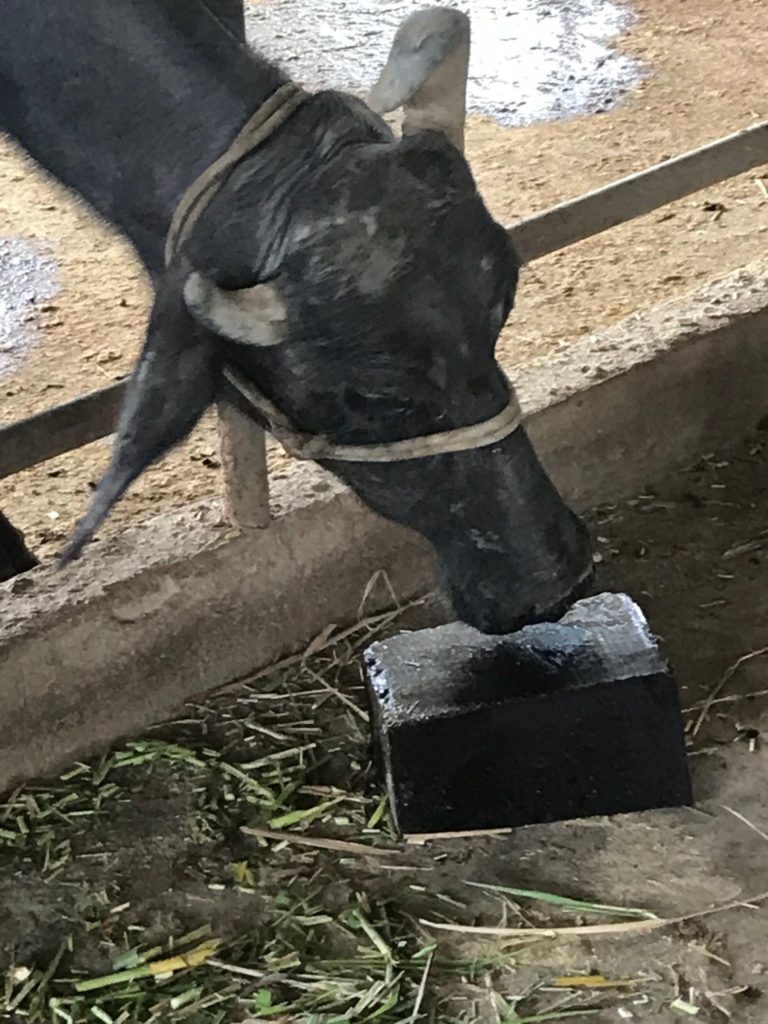
Cattle & buffalo readily seek access to nutrient supplementation blocks containing molasses (Photo: Peter Windsor)
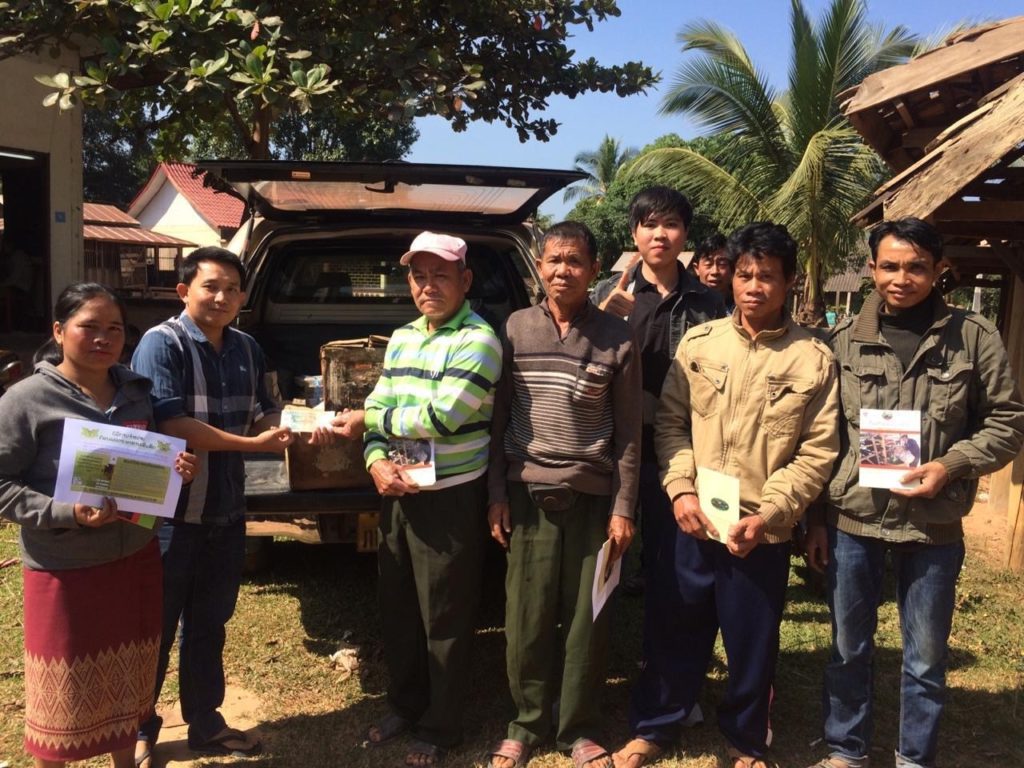
Sale of first molasses blocks to farmers in Luang Prabang province (Photo: Peter Windsor)
Farmers have also been impressed with how calf mortality is controlled by simply deworming neonates for the roundworm Toxocara vitulorm and that regular vaccination protects against mortality and morbidity from Haemorrhagic septicaemia and Foot-and-Mouth Disease (FMD). More recently, they have been impressed that treatment of FMD lesions with a simple spray of the wound therapy Tri-Solfen provides relief from suffering, hastening healing and saving on the costs of not treating animals with expensive and unnecessary antibiotics (Figure 5).
A very important component of our work is to let the scientific community know of the impact of the research and sharing the findings as they may be of benefit to other development programs throughout the world. Our MLR team member and PhD candidate Franny Earp, who has been living in Laos much of this year, recently won a presenters award at the ISESSAH (International Society of the Economics and Social Sciences of Animal Health) South East Asia Conference, in Bogor, Indonesia, October 17-18 (Figure 6). This followed her presentation on aspects of socioeconomic modelling of preventative health options data from our projects in Laos, as part of her PhD.
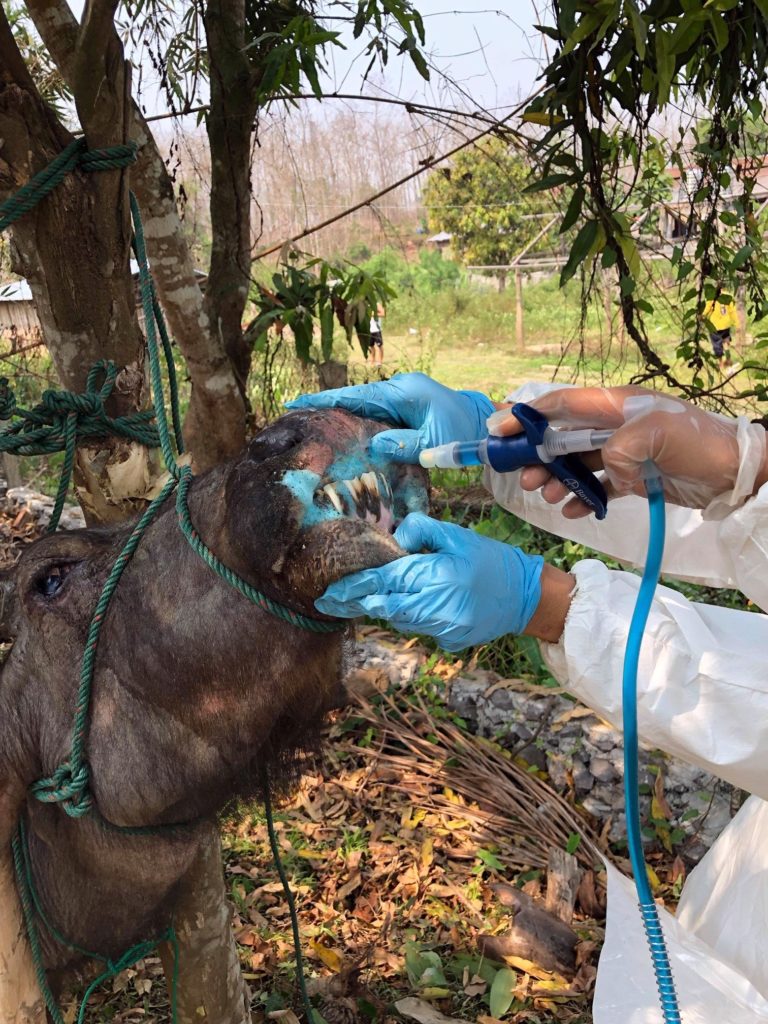
Lao buffalo treated for FMD due to an outbreak resulting from insufficient vaccine and biosecurity (Photo: Chick Olsson)
Even more recently, MLR team members Isabel MacPhillamy (Figure 7) and Peter Windsor presented papers at the GFRA (Global FMD Research Alliance) 2019 scientific meeting, in Bangkok, Thailand, October 29-31, discussing all things FMD. Isabel addressed the current challenges in implementing effective biosecurity on smallholder farms in the Mekong. Peter introduced the recent findings from Laos on the use of Tri-Solfen as a novel treatment for FMD, suggesting the likelihood that this approach should be part of more effective strategies to reduce antimicrobial use in livestock and limit the serious risk to the human population from AMR (antimicrobial resistance). The Australian company that produces this product (Medical Ethics; ME) agreed to be sponsors of the conference and the ME desk was very well attended. During the meeting, images were received of cattle with FMD in Nigeria also having been treated (Figure 8). A number of conference attendees from other countries took home samples of the product for trials, including scientists from India, Bangladesh, Kenya and Cameroon. Already, cattle and sheep with FMD lesions in Cameroon have now received pain relief treatment for their FMD lesions.

Ms Franny Earp recent winner of a presenters award at the ISESSAH Conference in Bogor (Photo: Helen Scott-Orr)
Our extensive work in the Mekong has shown the importance of a systems approach that improves rural livelihoods through increased productivity, focused initially on enhancing nutrition and reducing mortality risk. As learning has continued in our programs, many farmers have continued to improve their livestock husbandry skills and have recognised that healthier more valuable livestock offer pathways for reducing food insecurity and improving rural community resilience. This applied research model from the Mekong, as is well documented on the MLR website under the Resources then Publications tabs
(https://mekonglivestock.wordpress.com/publications), provides ample evidence that where demand for beef remains strong, enhancing productivity leads to improved animal health and welfare outcomes, with better lives for farmers and their animals through reduced rural poverty. The work of the MLR group is now ready for scale-out!
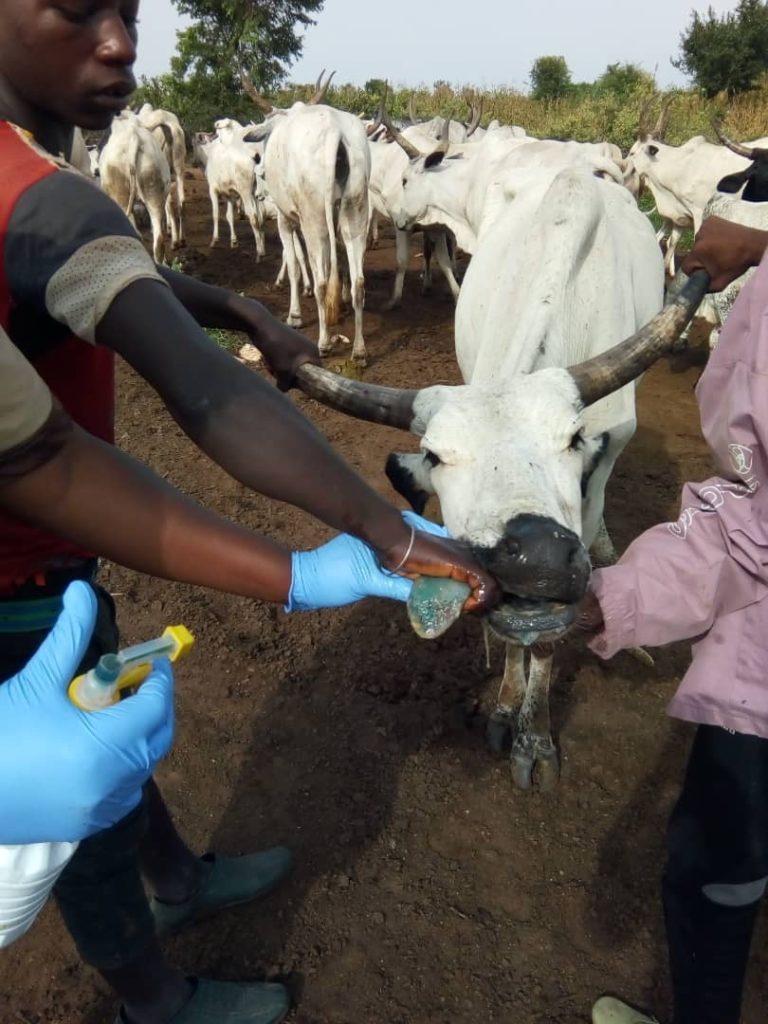
Cow in Nigeria with FMD oral lesions treated with Tri-Solfen (Photo: Peter Windsor)






